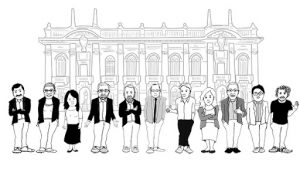There are too few nonprofit organizations like CC fighting for the commons – support our vital leadership with an end of year contribution. Donate today!
CC Open Education Platform Activities 2023
Open EducationThis post was prepared collaboratively by Jennryn Wetzler, Werner Westermann, Lisa Di Valentino, Dr. Suma Parahakaran, Tetiana Kolesnykova, Paola Corti, Dan McGuire, and Fernando Daguanno.

“Abstract Backgrounds” by NichoDesign is licensed via CC BY-NC-SA 2.0.
In February and March, the CC Open Education Platform community voted on five winning ideas to advance open education globally. Five project teams, spanning Argentina, Brazil, Chile, Ghana, Italy, Malaysia, Ukraine, South Africa, and the USA have received CC Open Education funds. The CC Open Education Platform also funded ongoing global community work supporting the UNESCO Recommendation on OER. We are delighted to share updates about the projects now underway.
CC lauds all of the open education community efforts, and we look forward to sharing additional highlights at the end of this year.
Title: Building a K-12 Interactive Open Textbook
Contact: Werner Westermann
Location: Chile

“Educación Ciudadana” by Werner Westermann is licensed via CC BY 4.0, except where otherwise noted.
Summary: The Building a K-12 Interactive Open Textbook project works with community members to support the development of a K-12 Open Textbook in the subject of Civics and Citizenship subject for 11th and 12th Grade, aligned to the official K-12 curriculum of Chile. Thus far, the project has gathered a core team focusing on content selection, H5P deployment, and graphic design. The core team has discussed: curricular alignment and structuring learning chapters; textual content creation and reuse; graphical content selection using Wikimedia Commons; creating learning chapters and reusing previous developments, using Interactive Book H5P tool. The team has H5P packages and trials hosted in Pressbooks, thanks to support of REBUS Foundation.
Title: Climate Change: OER integrating SDG components in Education in two Southeast Asian Countries
Contact: Dr. Suma Parahakaran
Location: Malaysia and Laos PDR
Summary: This project supports OER for Climate Change and the sustainable development goals (SDGs); it focuses on OER creation through experiential activities in schools. Where Malaysia’s Global Environment Center (GEC) focused on climate change and water resources education, Laotian Sri Sathya Sai Institution focused on climate change work, installing solar lights and solar-generated electricity to reduce a primary and secondary school’s carbon footprint and energy costs. The project has also created a greenspace within the Laotian school for students and staff to engage in outdoor learning and gardening.
The project will be compiling OER content from both education centers, and displaying videos, activities and other media outputs on the project website. Next steps include hosting a competition for Climate Change and network building for collaboration.
Title: “Popularization of OER in Ukraine: Small steps to a big goal”
Contact: Tetiana Kolesnykova
Locations: Ukraine and Italy

Image from Using Open Educational Resources in Teaching by Politecnico di Milano – METID is licensed via CC BY-NC-SA 4.0.
Summary: Polytechnic University of Milan has partnered with the Ukrainian State University of Science and Technologies (USUST) to translate and localize a MOOC on OER. The Polytechnic University’s learning innovation unit (METID) developed and shared a MOOC, “Using Open Educational Resources in Teaching” to meet the needs of Ukrainian teachers and academic library professionals. This partnership overcomes language barriers and ensures equitable and inclusive access to education in times of a full-scale war.
After METID and USUST agreed on a process and the necessary parameters to ensure the project would be sustainable for both partners, they adapted subtitles, infographics, the course description and summative weekly quizzes. USUST also created a bilingual version of the quizzes, which helps students in obtaining the MOOC’s final Certificate of Completion. Next steps include: creating instructions in Ukrainian; debugging video subtitles; verifying the MOOC content; and testing the process with teachers and librarians. USUST will also develop a mock-up of the Certificate of Completion of the course “Using Open Educational Resources in Teaching” released by Polimi Open Knowledge platform adapted into Ukrainian. The certificate will be generated in Ukrainian at the Ukrainian State University of Science and Technologies, indicating the amount of training in ECTS credits.
Title: STEAM Ahead with OER in South Africa project
Contact: Dan McGuire
Locations: Ghana, South Africa, and USA

Screenshot of the website for Rural Literacy Solutions.
Summary: This collaborative project creates, curates, and sources OER content that meets the needs of elementary students and is aligned with Ghanaian Education standards as well as South African standards. The project has a special emphasis on incorporating materials edited and adapted for and translated to the local languages in addition to the use of English language materials. Dan McGruire and colleague, Peter Amoabil, created a video explainer about the Ghanaian portion of the project, which works Amoabil’s nonprofit, Rural Literacy Solutions. There are some great pictures on their website of students reading OER materials in their local language on the server in their classroom that is not connected to the internet via an open source learning management system.
Title: Alquimetricos
Contact: Fernando Daguanno
Locations: Argentina and Brazil

Icon for Alquimétricos.
Summary: Alquimetricos is a STEAM OER project that inspires wonder, using card games, connectors and sticks to build geometric sculptures. Through experiential learning, the project develops students’ spatial, mathematical and kinetic understanding. For this phase of project work, Alquimetricos is developing a STEAM OER collection repository translated to English, Portuguese, and Spanish. The first draft translations will be machine-generated. Alquimetricos will then organize a set of online workshops and collabora-thons to share, revise translations and document the contents and replication process, inviting Creative Commons community members to join.
The project is also developing a card game, which teachers can download and share with their K-12 classes for STEAM education. The digital version will be free, and the printed version will be available for sale. Fernando piloted the project and card games with students and teachers at the International book fair at Comodoro Rivadavia, in Chubut, Argentina, a 10-day learning fair for over 10,000 people.
Next steps include: (1) providing a demo of the card deck at the CC Summit, in Mexico City this October. (2) Alquimetricos will also produce a short video summarizing case studies of its CC BY-licensed educational products being used.
Title: Global Commons: Unlocking Open Education with Creative Commons
Contacts: Lisa Di Valentino, John Okewole
Locations: Nigeria, USA, and global
Summary: This project is developing a short animated video describing Creative Commons and how it would accommodate the implementation of the UN recommendations for OER. The video will have narrations in different languages, potentially including: English, French, Spanish, Hindi, Mandarin could be the initial ones that would hopefully be ready by the end of the year. Team members are also developing 2-3 one-page graphic handouts explaining Creative Commons licenses, and the CC organization, also in different languages. Handouts will be shipped to CC Open Education Platform community members engaging in communications around the UNESCO Recommendation for OER.
Posted 02 August 2023